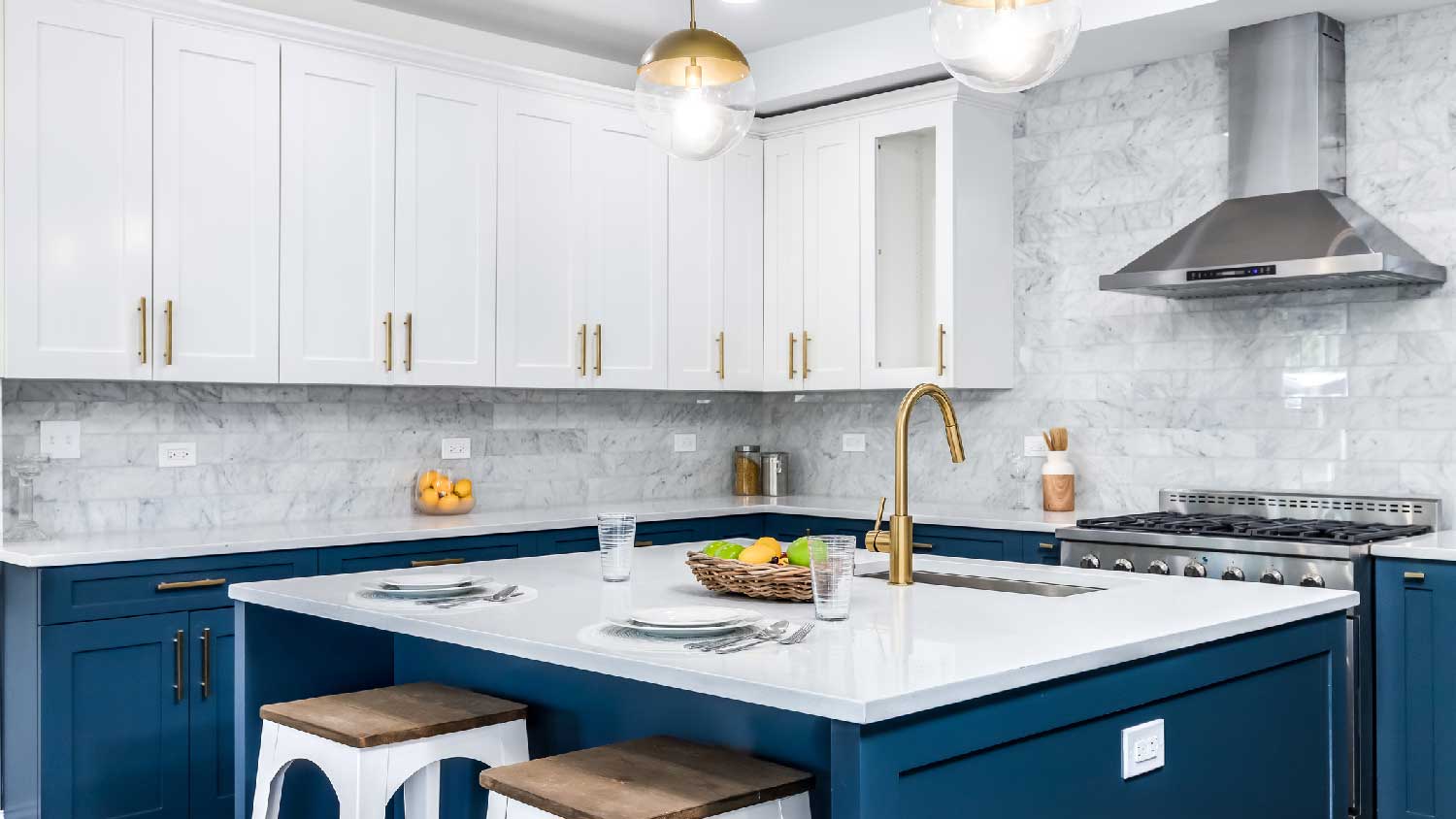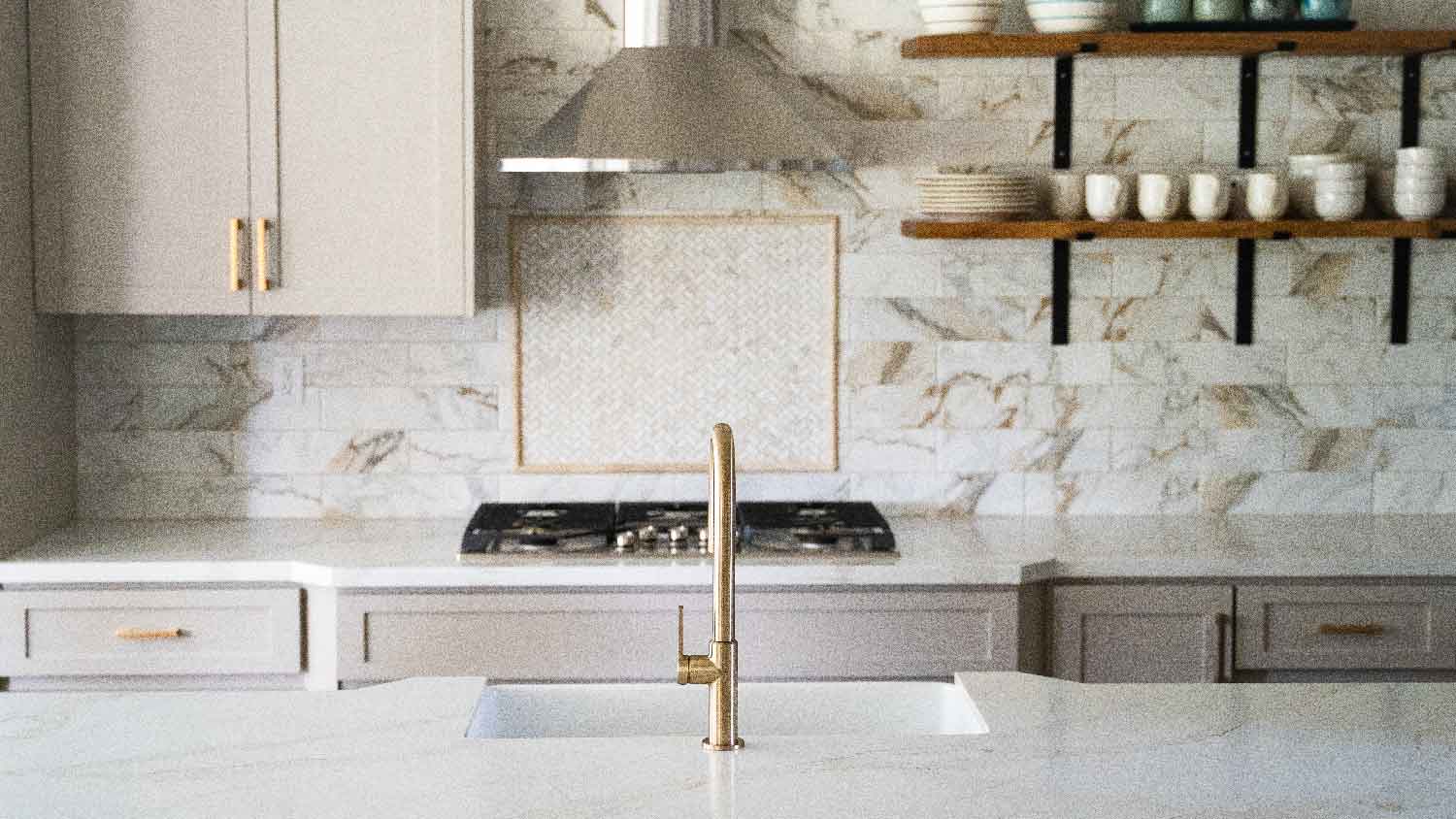
Butcher block countertops are a popular and durable choice for active kitchens. Learn how much it costs to install butcher block counters and what factors may affect pricing.
The battle between these two surfaces begins here


Corian is made up of acrylic resin with natural minerals.
Quartz is an engineered stone consisting of crushed natural quartz and resin.
Both materials are nonporous and more hygienic than natural stone.
Corian is more affordable, but quartz offers a better return on investment.
We understand the indecision. Choosing the best countertops for your home is a high-stakes choice that you must live with for years. So, of course, you want something that looks great and stands the test of time while adding value to your abode. Two popular options you'll often hear about are Corian and quartz. Here, we compare Corian vs. quartz countertops so you can pick the best one for your home and budget.
Unlike natural stone or wood, both countertop materials are human-made. Each one offers a seamless appearance without the hassle of matching sections or creating unsightly seams. However, quartz provides better durability and heat resistance, while Corian is less expensive and easier to repair if scratched or chipped. Remember, if you're unsure which surface is best for your home, a local countertop contractor can guide you.
You might’ve noticed the capital “C” in Corian. That’s because it’s a trademarked product by DuPont. Introduced in the late 1960s, Corian is a solid surface material made from a blend of acrylic resin and natural minerals. It’s non-porous, seamless, and available in a wide range of patterns and colors, often designed to mimic the look of natural stone.
| Pros | Cons |
|---|---|
| Seamless appearance | Scratches easily |
| Non-porous surface | Not heat-resistant |
| Comes in various colors | Not as hard as quartz |
| Simple to repair | Poor resale value |
| Costs less than stone | Loses shine over time |
Best for:
Kitchens where counters are not subject to heavy wear and tear
Homeowners looking for a practical and affordable countertop surface
People looking for a low-maintenance surface that doesn’t need sealing
These budget-friendly surfaces are a good stone countertop alternative with the added benefit of a seamless appearance. Unlike natural stone options like granite or marble, which show visible joints when using multiple slabs, Corian can be joined practically invisibly for a smooth look. Additionally, Corian is highly customizable since it is available in a range of colors and patterns that homeowners can customize in curved or straight shapes.
Additionally, Corian is nonporous, meaning it will not absorb spills that lead to staining and bacterial growth. This makes it a fantastic hygienic option for kitchens and bathrooms. Its nonporous nature makes the material much easier to clean using a mild cleaner and a soft sponge.
Another great perk is that Corian is repairable. Minor damage, including chips, scratches, and even burns, is easy for pros to sand and buff out. This allows homeowners to extend the counter's lifetime. Lastly, Corian feels warmer to the touch than natural stone, making it a more comfortable everyday surface, especially in winter.
Corian countertops have many benefits, but they may not be right for every dwelling. Below are a few drawbacks to consider before deciding what works best for your home.
Corian is durable, but as with most surfaces in your home, it is not indestructible. The material is softer than natural and engineered stone, making it more prone to scratching, chipping, and denting, especially if you slice and dice directly on the surface. It’s also sensitive to heat. Placing anything off the stovetop or from the oven on the counter will cause discoloration or warping. The material is also susceptible to UV rays, causing its surface to fade or discolor over time.
While many homeowners appreciate Corian's ability to mimic the look of marble or granite, it does not quite deliver the same depth, texture, or sense of prestige. For those aiming to boost their home's resale value with a high-end kitchen, materials like engineered or natural stone tend to be more attractive to buyers. While a step up from laminate, Corian is generally not viewed as a luxury feature.

Quartz is an engineered stone made from crushed natural quartz blended with pigments and resins. Like Corian, it is nonporous and uniform in appearance, unlike natural stone, making it both durable and design-friendly. Quartz is very popular with homeowners who want the look of stone without the upkeep, like regular sealing or using special cleaners.
| Pros | Cons |
|---|---|
| Scratch-resistant | Not heatproof |
| Low-maintenance | Expensive |
| Stain-resistant | Heavy material |
| Wide color range | Installation requires a pro |
| Nonporous surface | Indoor use only |
Best for:
Busy kitchens that require resilient countertops
Homeowners looking for a low-maintenance stone surface
Indoor use
Quartz is much harder than most types of natural stone, so it is more resistant to damage, especially when compared with Corian. While it is not heatproof, quartz is also way more heat-resistant because it can handle higher temperatures.
Plus, unlike natural stone options like marble, quartz is nonporous and never needs sealing to prevent stains from spilled coffee, juice, or cooking oils. Its nonporous nature not only makes it moisture-resistant but also more hygienic compared to natural stone. Also, if you are not a fan of doing chores, quartz makes cleaning up a snap using mild soap and water.
Homeowners looking for a range of exciting design choices won't be disappointed because the material perfectly mimics the look of most types of luxurious natural stone. Additionally, kudos to quartz's uniform appearance, which offers visual consistency.
While quartz is more heat-resistant than Corian, you will still need hot pads or trivets for extremely hot items. The resin in quartz countertops can warp or discolor if exposed to high cooking temperatures.
Quartz is also not the most budget-friendly option. It can be as expensive as natural stone, sometimes even more, and the material is pretty heavy, potentially leading to higher installation costs. Older or weaker cabinetry may need reinforcement to support the slab without sinking or warping.
Finally, quartz isn’t ideal for outdoor use. Prolonged sun exposure can cause fading or yellowing, and it doesn’t handle extreme temperature changes well. A more weather-resistant material may be a better choice if you’re designing an outdoor kitchen or patio space.

Now that you know how Corian and quartz compare, let’s see which one comes out on top in each category below.
From a purely visual standpoint, Corian and Quartz offer seamless countertops in various natural stone colors and patterns.
Regarding customization, Corian offers more flexibility in curved shapes, colors, and seamless designs. Quartz, while available in a wide range of styles, is more limited in shaping and edge detailing.
In this competition, quartz is the toughest one in terms of durability. It’s much harder, more scratch-resistant, and better at resisting damage from ordinary use than Corian.

Corian is usually more affordable to install than quartz. The cost to install Corian countertops averages $3,950, while the cost to install quartz countertops is around $4,500. While that may not seem like a huge price difference to some, those extra dollars can really add up, particularly for large kitchen projects.
Once again, Corian has the major advantage. When it comes to repairs, minor scratches, chips, or stains can often be sanded and buffed away by an experienced DIYer or a pro, restoring the surface. On the other hand, Quartz usually requires professional help for fixes, and even then, it can be tricky to make repairs invisible.
Quartz resists staining and scratching like a champ, giving it the edge over Corian. While both surfaces are nonporous, Corian damages much more easily and requires more frequent repairs to maintain its good looks.
According to the experts, quartz reigns supreme, with an average lifespan of 25 to 50 years or more. With proper care, Corian countertops can also last for decades, up to 30 years.
For homeowners looking for a better return on their investment (ROI) when it is time to sell, quartz is the top choice over Corian. While Corian is more affordable upfront, it doesn’t carry the same premium perception or long-term value as quartz in most real estate markets.
From average costs to expert advice, get all the answers you need to get your job done.

Butcher block countertops are a popular and durable choice for active kitchens. Learn how much it costs to install butcher block counters and what factors may affect pricing.

The cost of stainless steel countertops may seem shocking compared to laminate, but their durability may be worth it. Here’s how much you can expect to spend.

Discover the cost of installing laminate countertops, including how their size, material, and finish impact your total price.

If your kitchen needs a facelift, you can give your outdated counters a new life by learning how to paint Formica® countertops.

Those dull, annoying marks on your countertop might not be stains. Discover what stone countertops etching is and what you can do about it.

Nonporous kitchen countertops offer many affordable and attractive-looking options while being relatively maintenance-free. Here are six options to consider.